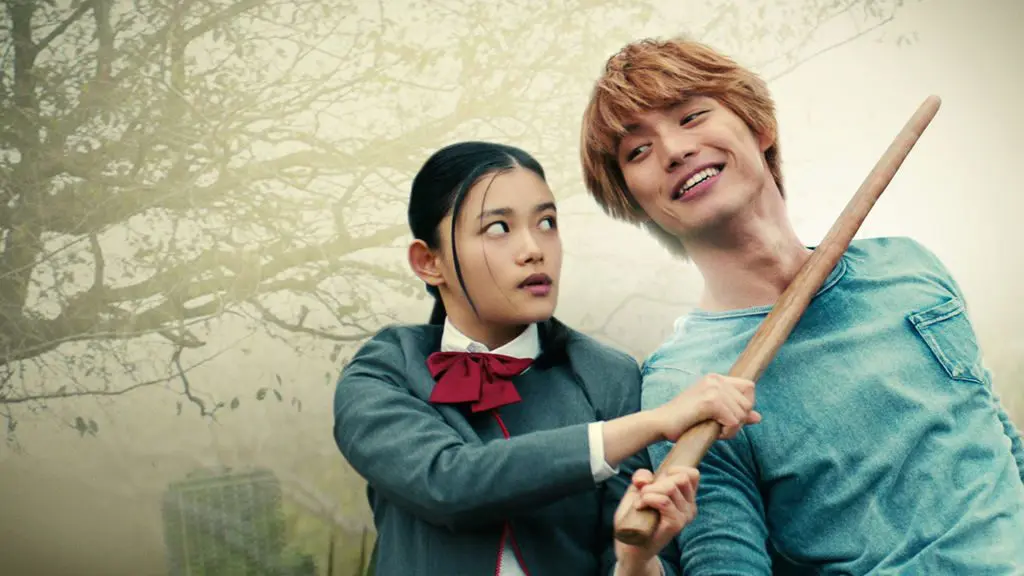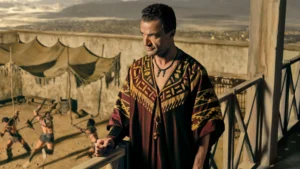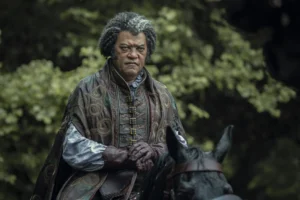Summary
Netflix’s live-action adaptation of Bleach will please some fans with its faithfulness, but the contraction to feature-length hurts the story.
I’m not the best person to review Netflix’s new live-action adaptation of Bleach, having neither seen the anime nor read the manga it was based on. If you’re an eager fan well-versed with the source material, maybe take my opinion for what it’s worth – which isn’t very much, all things considered. Then again nobody’s opinion really is, and if a film released worldwide on history’s most popular streaming platform can’t function on its own terms, then it’s my duty to say so. Luckily, Bleach, at least for me, functions rather well.
The story concerns Ichigo (Sôta Fukushi), a handsome and well-liked high-school student with ginger hair – I thought those things were mutually exclusive, but whatever – who lives with his weirdly over-the-top father, Isshin (Yôsuke Eguchi), and his cute younger sisters, Karin and Yuzo. All seem well-aware of Ichigo’s peculiar ability to see spirits, which is likely why Isshin randomly puts him in chokeholds and gives him a slap now and again; he’s sick of Ichigo showing up late to dinner because he’s been out helping dead kids cross to the afterlife, which is understandable, I guess. Plus he’s bringing up three kids on his own since Ichigo’s mother was offed in a flashback prologue that you might be surprised to learn loops back into relevancy when Ichigo discovers the extent and source of his abilities.
These are explained to him by Rukia (Hana Sugisaki), an austere swordswoman who turns up in Ichigo’s bedroom having been attracted by his overflow of spiritual energy. This, for the uninitiated, is really just a fancy repackaging for any old “chosen one” gimmick, but Bleach at least has the decency to tie it into a notably under-explained mythology. See, there are two types of spirits in the world of Bleach: Wholes, who need to be sent along to a heavenly afterlife known as the Soul Society by a ritual; and Hollows, who died with a grudge and need to be sliced up good and proper. And who better to accomplish both of those tasks than an enigmatic sect known as Soul Reapers, of whom Rukia is a representative.
This is a lot of worldbuilding to get through in a feature film, and in the early-going Bleach suffers for it, massively, chock so full of heavy-handed exposition that at one point it cuts to an explanatory diagram just to make things easier. They’re not difficult concepts to grasp – if anything, without the benefit of a longer runtime or an episodic format, they’re too simplistic for their own good – but so much of it is integral to the (slightly overlong, but enjoyably bombastic) finale that there’s no choice but to frontload all the details in the first two acts.
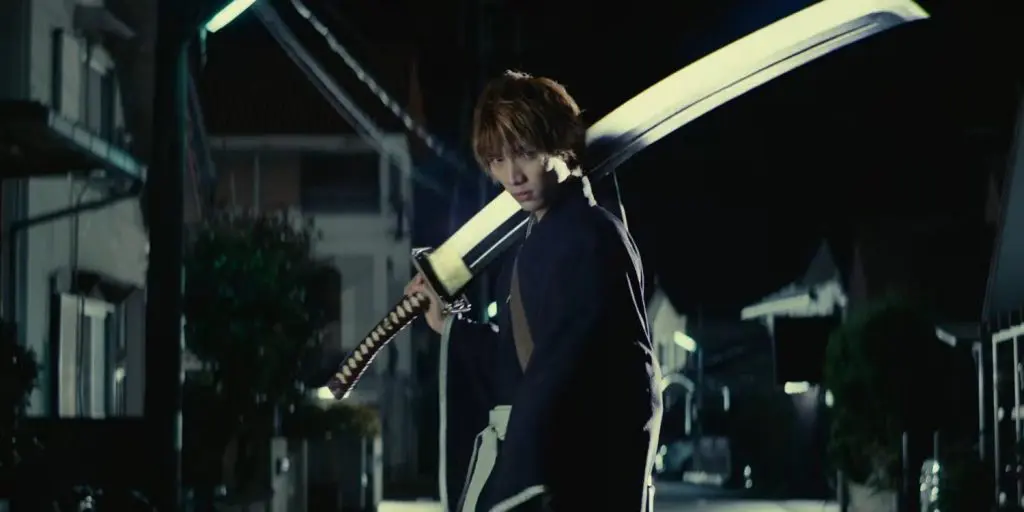
Rukia has a glowing purple rock which tracks Hollow movement through some kind of spiritual GPS technology (perhaps don’t think too much about that) and before long a particularly peckish one has plunged a spectral fist through the side of Ichigo’s crib and nabbed his little sister, Yuzo. I should note that Hollows eat the souls of the spiritually-sensitive, which is explained out loud and then confirmed by the Hollow itself, who turns to Ichigo immediately afterwards and says quite matter-of-factly, “I want your soul.” As I said, these aren’t difficult concepts to grasp.
The subsequent action sequence looks surprisingly good, all things considered, and while Bleach might occasionally utilize some cheeky quick-cuts so you don’t focus for too long on any ropey visual effects, the film has a good sense of design and scale. (The human-sized action is a lot better – actually, if we’re being fair, it’s really good, but there isn’t all that much of it.) The scrap doesn’t go especially well for Rukia, though, who is severely injured and forced to transfer her Soul Reaper powers to Ichigo, who morphs into his fighting attire and whips out a comically large sword to strike an early hero pose. That kind of shit always goes over well in the west (think Final Fantasy VII for the most iconic example) and as I understand it Bleach enjoys a lot of popularity in these parts. You can see why.
In a storytelling sense, though, I’d have liked to see this transition occur after getting to know Ichigo a bit better, particularly since after rather effortlessly despatching his first ever beastie he almost immediately reverts back to being a talentless rookie with no skill or training. Bleach has a tendency to lurch back and forth with its characterisation sometimes, which is likely another consequence of the feature-film format, as well as, I suspect, a desire to hit certain iconic beats as early as possible.
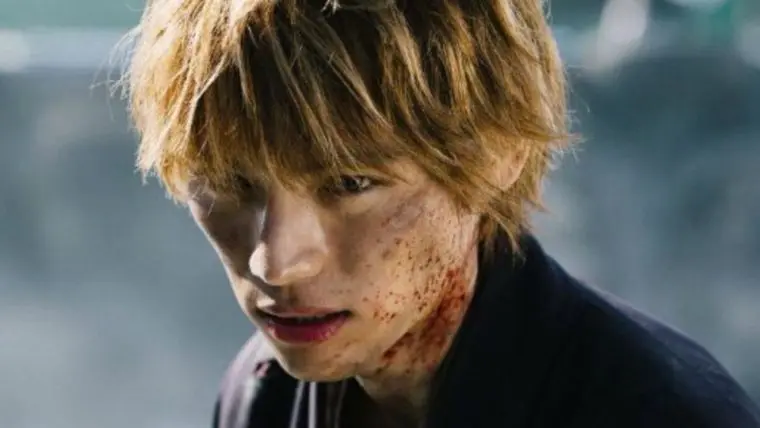
No matter. In the aftermath, Rukia is forced to stick around, as she can’t return to Soul Society after giving her powers away. She moves into Ichigo’s house and sleeps in his closet wearing his little sister’s pyjamas, and attends Ichigo’s school in a “faux-body” – Reapers apparently aren’t human and don’t have bodies of their own, even though we never see them without human bodies, so whatever – which gets on the nerves of Ichigo’s pretty crush, Orihime (Erina Mano), and the local curtain-haired misanthrope, Uryu (Ryô Yoshizawa), who is secretly a surviving member of a tribe called the Quincy who are expert archers and hate the Reapers because reasons.
I’m not trying to be flippant there, either. “The Reapers killed my tribe” is the only explanation supplied by Bleach, which really does a disservice to Uryu’s motivations. Another casualty is Chad, who shows up in an early scene as one of Ichigo’s best mates and then barely speaks to him again until they share a moment of brotherly solidarity towards the end. The film treats important worldbuilding concepts the same way, refusing to reveal much about the Reapers or their strict, Jedi-like code, which forbids personal attachment and getting laid, and also, apparently, giving your Reaper powers to humans. As a consequence Rukia’s brother, Byakuya (Miyavi), shows up with his red-haired, tattooed henchman, Renji (Taichi Saotome), looking to start some shit. And all the while a fabled, all-powerful Hollow known as Grand Fisher is stalking Ichigo and his ever-so-tasty spiritual energy.
There’s a lot to dislike and complain about here, but don’t get the wrong impression. Bleach, despite being noticeably hamstrung by the format, still provides a lot to like, from a well-defined central relationship between Ichigo and Rukia (complete with obligatory Rocky-style training montage), some exciting, well-staged action beats, and a lively imagination. It might be a slightly tougher sell for those who aren’t familiar with the source material, and some of the adjustments it likely makes to that source material might piss off some established fans, but there’s inevitably going to be a group in the middle who find a lot of enjoyment here. Good on those people. I enjoyed it too.

